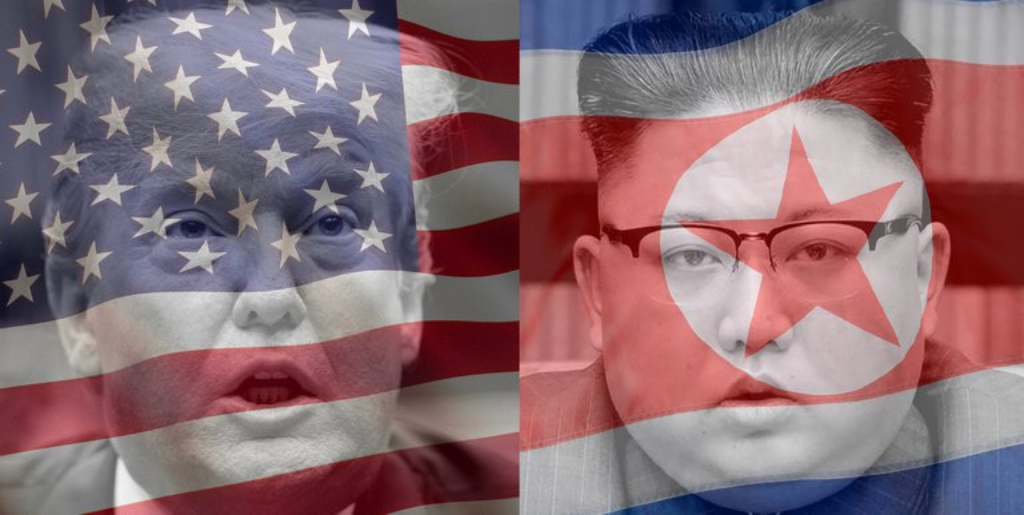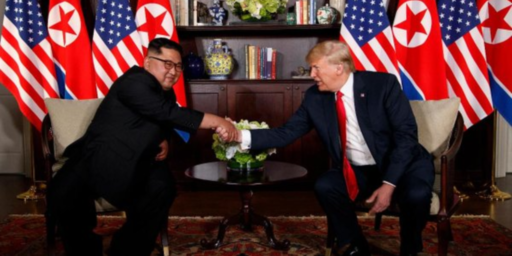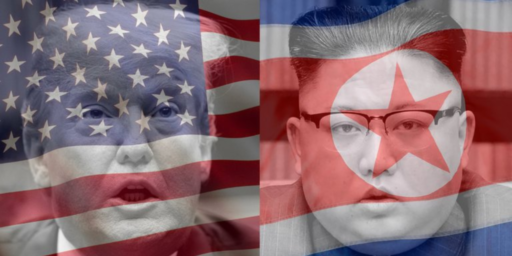Ahead Of Singapore Summit, The U.S. And North Korea Still Seem Very Far Apart
With the start of the Singapore Summit just hours away, it's not at all clear what the respective parties can possibly agree to other than what amounts to a photo opportunity.

In just over twelve hours from the time this post is being written, just as evening is hitting the Eastern United States and the afternoon commute is hitting in the west, President Trump and North Korean leader Kim Jong Un will become the first leaders from their respective nations to meet face-to-face in the seventy years that the DPRK has existed. Over those seventy years, the relationship between the United States and North Korea has vacillated between largely non-existent to openly hostile depending largely on what game the leadership in Pyongyang was playing. Over the past nearly thirty years, though, the relationship or lack thereof has taken on a new tone as the DPRK has moved slowly but steadily forward on programs to develop nuclear weapons and ballistic missiles capable of reaching not just neighbors such as the South Korea and Japan, but also the United States. Efforts to bring a halt to those programs proved to be largely unsuccessful thanks in no small part to the fact that the North Koreans would routinely enter agreements only to violate them years later after they’d gotten what they wanted whether that was food aid or an easing of international sanctions.
Eventually, those programs began to yield success and, by last year, the DPRK had seemingly demonstrated that it had both the capability to produce increasingly powerful atomic bombs, and potentially thermonuclear devices, and the means to deliver them potentially as far as U.S. territories such as Guam, as well as Hawaii and the western United States. Last year, as President Trump entered into office, we saw tensions on the peninsula ramp up to levels that we had not seen in quite some time. Both sides exchanged what can only be called stark rhetoric that seemed to blatantly threaten a resumption of war as well as exchanging insults between the leaders of the two nations via DPRK press releases on the one hand and Presidential tweets on the other.
Things began to change noticeably at the start of the year, though, with Kim Jong Un’s New Year’s Day address during which he extended an olive branch to the Republic of Korea. For the most part the speech was filled with broad generalities regarding a more peaceful relationship with the Republic of Korea, however, Kim was specific regarding at least some of what he had in mind. This included small items such as North Korean participation in the then-upcoming inter Olympics It was based on this speech that we saw the first joint talks between the two nations in nearly a decade. This eventually led to the surprise announcement that President Trump had accepted an invitation to meet with Kim at some point during this year, a summit meeting at the Demilitarized Zone between Kim Jong Un and South Korean Moon Jae In and, now, to the summit this week in Singapore.
As we head into the meeting, though, it seems fairly clear that the two nations remain very far apart on the core issues between them:
When President Trump and North Korean leader Kim Jong Un shake hands for the first time and sit down one-on-one here Tuesday, the bonhomie they plan to project will mask the huge gulf between their two countries as diplomats struggle to broker a deal for the rogue state to abandon its nuclear weapons.
The decision by Trump and Kim to begin their Singapore summit without their top advisers or nuclear arms specialists in the room underscores that their real goal here is to develop a personal rapport and stage a global spectacle rather than to ink the technical details of a denuclearization accord.
Both nations have sought to lower expectations for an immediate breakthrough this week in Singapore. Trump has described Tuesday’s summit as the first step in what could be a lengthy process, dangling the possibility of inviting Kim to the United States for a second meeting. And in an indication that Kim is like-minded, North Korean state media described a process of normalizing relations with the United States that would unfold over time.
(…)
The working-level sessions, including those led by Secretary of State Mike Pompeo, have foundered repeatedly over basic issues of what the summit should be about and an inability to close fundamental gaps in understanding over North Korean denuclearization.
Pompeo told reporters Monday that the day-long talks were going well but would not provide details.
“North Korea has previously confirmed to us their willingness to denuclearize, and we are eager to see whether those words prove sincere,” Pompeo said.
A key stumbling block in the negotiations has been what comes first. The North Koreans want a firm security guarantee, meaning a promise that the United States will not attack or seek to overthrow Kim. The Americans want a substantive denuclearization pledge.
Victor D. Cha, a former national security official who has negotiated with North Korea in the George W. Bush administration, said, “It’s not surprising that they’re stuck.”
“They can’t even get past first base on the security assurances because the North Koreans will never define what it actually means to end the hostile policy,” said Cha, who was considered by Trump to be ambassador to South Korea.
Leading Monday’s talks in Singapore were veteran U.S. diplomat Sung Kim and North Korea’s Choe Son Hui, a vice foreign minister with a long history of dealing with the United States. They were still trying to draft a joint statement outlining the areas of agreement for Trump and Kim. Typically, such precooked statements, or communiques, are worked out far in advance of summits.
U.S. negotiators have been unable to get the North Koreans to offer a substantive pledge on denuclearization up front, which has been the chief demand of the Trump administration.
The issue plagued a May 27 meeting in Panmunjom between U.S. and North Korean diplomats, according to a person familiar with the discussions. The talks began with the North Korean side, led by Choe, saying denuclearization should not be on the table for the Singapore summit — a position rejected by the Americans as a nonstarter.
Meanwhile, The New York Times notes that Kim and Trump likely have differing definitions of what ‘denuclearization’ actually means. This is something that has been noted several times as we have approached the summit that begins when the day starts tomorrow in Singapore. Repeatedly, and most recently at the end of May, it’s been reported that the North Koreans are willing to put ‘denuclearization’ on the table. At the same time, the Trump Administration has said that agreeing to the ultimate “denuclearization” of the Korean Peninsula is something that the DPRK must agree to if any talks are to go forward. It’s been clear for some time, though that the North Korean idea of “denuclearization” is far different from what the United States has in mind. Those differences rarely get discussed in the American media and they certainly aren’t being acknowledged by the Trump Administration even as we head into a meeting that could lead to either a historic breakthrough or a return to the standoff that has existed on the peninsula for so long, along with the possibility of increased tension that could send back down a course that makes a military clash seem more likely.
In the mind of the United States. South Korea, and other American allies in the region, of course, “denuclearization” essentially means the “complete, verifiable, irreversible dismantlement of the North Korean program.” Repeatedly, it has been made clear that in the minds of American negotiators this is essentially a one-sided deal in which the North Koreans give up their nuclear weapons, and their research program, in exchange for things such as sanctions relief and, perhaps, some loosening of the restrictions on international trade. When the North Koreans talk about “denuclearization,” though, they speak of the “denuclearization of the Korean Peninsula.” This means not only some action on the part of the North Koreans, but also the understanding that the United States would remove any nuclear weapons it may have in the region and that it would renounce the idea of providing South Korea and Japan with a “nuclear umbrella,” which is essentially the threat that any attack on an American ally. It is also fairly clear that the North Koreans also include in their definition of “denuclearization” the idea that the American military presence in South Korea, and potentially in Japan, which the DPRK has made clear it considers to be part of the nuclear threat posed by the United States. These are, quite obviously, very different perceptions of what the goal of “denuclearization” actually means, and it could make progress this week, or any time in the foreseeable future difficult.
As I’ve said before, this difference in an understanding of what “denuclearization” means to each side makes sense when you view it through the lens of history, specifically the example of Libya that clearly demonstrates that Kim would be foolish to give up his nuclear weapons, his nuclear research program, or his ballistic missiles. Not long after the beginning of the Iraq War, Libya approached the United States and other western nations and ulimately agreed to a deal under which it surrendered its WMD research programs, which included a nuclear component that was nowhere near as advanced as what North Korea has today, in exchange for relief from decades of sanctions and some form of a security guarantee for the regime
Shortly after the war against Iraq began, Libya essentially approached the United States and other western nations and offered what amounted to a deal under which the nation would surrender its nuclear and WMD research program in exchange for sanctions relief and some sense of a guarantee that the regime in Tripoli would not suffer the same fate as Saddam Hussein. Rather than survival, though, by 2011 Libya found itself in the middle of a civil war with the United States, the United Kingdom, and France actively intervening on the side of anti-regime rebels. At the end of that civil war, of course, Libya’s leader was dead in a gutter at the hands of his own people. This followed on the example of Iraq, which found itself invaded in 2003 notwithstanding the fact that the nation had abandoned its WMD program at the end of the Persian Gulf War. Within just a few months after that invasion, Saddam Hussein had been captured and would ultimately be put on trial and put to death. , after which he faced a trial and ultimately execution. This, as I’ve said before, is why the invocation of the so-called Libya model by National Security Adviser John Bolton, President Trump, and Vice-President Pence over the past month has not gone over well with North Korea. As many foreign policy advisers observed that these remarks could easily be interpreted as a threat by the DPRK. Based on the Libya lesson, then, North Korea would be foolish to give up whatever nuclear stockpile it has absent concessions from the United States that it seems it would be very unlikely to get. Even with those concessions, though, President Trump’s own behavior over the past month with regard to international agreements such as the Trans-Pacific Partnership, the Paris Climate Accords. and most significantly the nuclear deal with Iran all call into question the extent to which the United States can be trusted to keep its word, at least as long as Donald Trump is President of the United States.
At this point, of course, we’re all in the speculation stage because there’s quite literally no precedent for the meeting that will take place in Singapore beginning around 8:00 pm Eastern time in the United States. Given the rather sparse level of apparent pre-summit preparation, it seems highly unlikely that there will be any kind of major agreement or breakthrough announced. This would seem to be especially true given the fact that the White House announced this morning that Trump is now expected to leave Singapore on Tuesday evening local time rather than Wednesday morning. This means that there will be one day of meetings between Trump and Kim, and perhaps only one meeting at all that is expected to last no longer than an hour or so. This makes it less likely that there will be any major breakthrough or any major concessions by the North Koreans. No doubt, President Trump and his supporters will try to spin whatever comes out of that meeting as a win for Trump. In reality, though, it seems far more likely than ever that, as James Joyner noted when the idea of a summit was first announced, In the end, it seems clear that the most likely outcome of the summit is that Kim will have won because he will be seen on the world stage as the equal of the President of the United States and he will will have achieved the kind of international recognition that eluded his predecessors Kim Il Sung and Kim Jong Il. What good comes out of that for the United States and its allies is, quite frankly, hard to see.





I realize I’m in a minority, but I’ll repeat: Kim’s nukes are not the point. Trump made them the point by getting hysterical, but they are not the point. Kim was never going to launch against the US unless we tried regime change which we’d have to be insane to try. The nukes were insurance against a US attack. If Kim gives up his nukes in exchange for a peace agreement and sanctions relief – and Trump has promised to make him rich – that’s a win for Kim, and at very best a nothing for us. It is also a huge win for China.
If a year from now Kim is alive, in power, with money coming in, and what we got is genuine, real, verifiable de-nuclearization as defined by us – China wins, Kim wins, we gain nothing but the elimination of an over-hyped threat. We are paving the way for the diminution of American power in the Pacific. Japanese, Taiwanese and South Korean voters will notice and those countries will move toward China. They’d be stupid not to.
And we’re not even going to get any of that denuclearization, because Trump is the World’s Worst Negotiator™.
As you mention, above…Dennison has already announced he is leaving earlier than planned…so yeah…a big photo op.
Kim wins. Dennison gets played again.
The last several days have shown, in sharp relief, the rank incompetency of this White House.
People joke about Trump bankrupting several casinos, but at this point I think Trump could bankrupt a Treasury printing press.
I’d be satisfied if he doesn’t announce the US will supply North Korea with ICBMs with thermonuclear warheads, that Mexico will pay for.
@Kathy: If he did, the Trumpers would just say “Whatabout Hillary selling all our Uraniums?”
@Kathy:
BREAKING CNN: Trump says United States will join Axis of Evil to defend against Canadian predations.
I’m praying this ends up as just a photo op. If the great negotiator actually negotiates I fear he’ll give them Guam for thirty silver Korea Peoples won.
You’re giving the Orange Toddler too much credit…he’d probably give away Guam for a bag of magic beans…
Here’s an interesting tidbit: every accredited journalist at this summit meeting gets a free USB fan in their press kit. Super convenient, just plug it into your laptop and it will keep you cool in the Singapore heat…while it infects your machine with advanced malware and listens to everything you say.
https://twitter.com/bartongellman/status/1006288000106549248
I believe that Kim is going to stick around long enough to get a great photo of himself and Trump shaking hands, and he’s out of there.
He’s not going to give up his Nukes. Why should he? What’s the US going to do? Impose sanctions? After what happened at the G-7, why would Kim trust anything Trump said?
Lose. Lose. I listened to Mark Levin today just going off on Trump in regards to the NK issue, and, more importantly, tarrifs. He very logically broke it down as to how tarrifs equals greater prices.
It’s a big world. USA is still the top dog, but not for much longer the way it’s going.
@An Interested Party:
You know, in the story the beans were magic, and led Jack to the giant’s castle and much treasure…
So we know the Cheeto won’t be clever enough to deal for that 😛
@Kathy: Wow! That’s a low bar! Even I have higher hopes than that, and I think Trump will make a hash of things. At least with a short meeting and an early leaving (because–according to what I read in a headline splash “events are proceeding too quickly [???]) he should be able to avoid giving away the farm for a while.
North Korea is receiving more coverage from the US Networks and newspapers than South and Central America(There is a election campaign in Mexico right now, for instance), Europe, Africa and Asia.
For Kim, that is a tinpot dictator, he is being treated as the leader of a superpower, and that is a huge propaganda win. For Trump that’s also a huge propaganda win, because he is doing negotiations with the leader of a pretty small country that is being treated as the leader of a superpower.
That’s more than enough for these two.